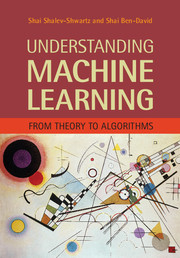Book contents
- Frontmatter
- Dedication
- Contents
- Preface
- 1 Introduction
- Part 1 Foundations
- 2 A Gentle Start
- 3 A Formal Learning Model
- 4 Learning via Uniform Convergence
- 5 The Bias-Complexity Trade-off
- 6 The VC-Dimension
- 7 Nonuniform Learnability
- 8 The Runtime of Learning
- Part 2 From Theory to Algorithms
- Part 3 Additional Learning Models
- Part 4 Advanced Theory
- Appendix A Technical Lemmas
- Appendix B Measure Concentration
- Appendix C Linear Algebra
- References
- Index
7 - Nonuniform Learnability
from Part 1 - Foundations
Published online by Cambridge University Press: 05 July 2014
- Frontmatter
- Dedication
- Contents
- Preface
- 1 Introduction
- Part 1 Foundations
- 2 A Gentle Start
- 3 A Formal Learning Model
- 4 Learning via Uniform Convergence
- 5 The Bias-Complexity Trade-off
- 6 The VC-Dimension
- 7 Nonuniform Learnability
- 8 The Runtime of Learning
- Part 2 From Theory to Algorithms
- Part 3 Additional Learning Models
- Part 4 Advanced Theory
- Appendix A Technical Lemmas
- Appendix B Measure Concentration
- Appendix C Linear Algebra
- References
- Index
Summary
The notions of PAC learnability discussed so far in the book allow the sample sizes to depend on the accuracy and confidence parameters, but they are uniform with respect to the labeling rule and the underlying data distribution. Consequently, classes that are learnable in that respect are limited (they must have a finite VC-dimension, as stated by Theorem 6.7). In this chapter we consider more relaxed, weaker notions of learnability. We discuss the usefulness of such notions and provide characterization of the concept classes that are learnable using these definitions.
We begin this discussion by defining a notion of “nonuniform learnability” that allows the sample size to depend on the hypothesis to which the learner is compared. We then provide a characterization of nonuniform learnability and show that nonuniform learnability is a strict relaxation of agnostic PAC learnability. We also show that a sufficient condition for nonuniform learnability is that H is a countable union of hypothesis classes, each of which enjoys the uniform convergence property. These results will be proved in Section 7.2 by introducing a new learning paradigm, which is called Structural Risk Minimization (SRM). In Section 7.3 we specify the SRM paradigm for countable hypothesis classes, which yields the Minimum Description Length (MDL) paradigm. The MDL paradigm gives a formal justification to a philosophical principle of induction called Occam's razor. Next, in Section 7.4 we introduce consistency as an even weaker notion of learnability.
Information
- Type
- Chapter
- Information
- Understanding Machine LearningFrom Theory to Algorithms, pp. 58 - 72Publisher: Cambridge University PressPrint publication year: 2014
